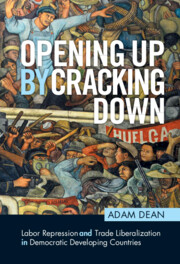 Opening Up by Cracking Down
Opening Up by Cracking Down Published online by Cambridge University Press: 19 October 2022
This chapter shows how labor repression played a crucial role in the history of free trade in many democratic developing countries. While the regression analyses in the previous chapter show that my argument is robust to alternative explanations and generalizable across more than 100 developing countries, this chapter begins to fill in the missing pieces - the causal mechanisms - that link democracy, labor repression, and trade liberalization.
To save this book to your Kindle, first ensure [email protected] is added to your Approved Personal Document E-mail List under your Personal Document Settings on the Manage Your Content and Devices page of your Amazon account. Then enter the ‘name’ part of your Kindle email address below. Find out more about saving to your Kindle.
Note you can select to save to either the @free.kindle.com or @kindle.com variations. ‘@free.kindle.com’ emails are free but can only be saved to your device when it is connected to wi-fi. ‘@kindle.com’ emails can be delivered even when you are not connected to wi-fi, but note that service fees apply.
Find out more about the Kindle Personal Document Service.
To save content items to your account, please confirm that you agree to abide by our usage policies. If this is the first time you use this feature, you will be asked to authorise Cambridge Core to connect with your account. Find out more about saving content to Dropbox.
To save content items to your account, please confirm that you agree to abide by our usage policies. If this is the first time you use this feature, you will be asked to authorise Cambridge Core to connect with your account. Find out more about saving content to Google Drive.